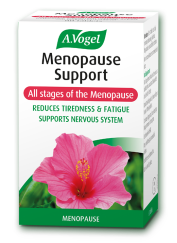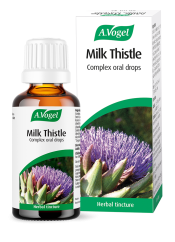Read the full video transcript below
Today's topic
Hello, and welcome to my weekly video blog A.Vogel Talks Menopause. Now, how is your liver doing? I bet you’re sitting there thinking, “What on earth does the liver have to do with the menopause?” Well, actually it can have quite a lot to do with the menopause and the types of symptoms that you’re actually getting. And Alfred Vogel, the renowned naturopath who founded Bioforce, actually believed that the liver was the regulator of your health. And your day-to-day health would depend on how efficiently your liver was running.
What does the liver do?
So what exactly does the liver do? It does hundreds of different jobs to help to keep you healthy. But some of them can actually be really associated with the menopause.
Your liver helps to store fuel for when you actually need more energy. Your liver helps to keep your blood glucose levels maintained properly. Your liver helps to clean your blood and keep it free of toxins that might cause problems. Your liver also helps with blood clotting. It also helps with the production and flow of bile. It also stores certain vitamins as well, and it helps to synthesize your hormones.
How does this affect the menopause?
So let’s have a look at these actions just a little bit more closely, and see how they can be associated with the menopause.
Fatigue
We know that the menopause can really drain you of energy. And so many women complain and just say, “My get up and go has gone. I’ve got absolutely no energy left at all.” And you can feel really, really fatigued.
Hot flushes, palpitations, dizziness and headaches
Now, poor glucose control levels can happen a lot during the menopause. They can go up and down quite a bit. And fluctuating glucose levels can trigger hot flushes. They can cause palpitations. They can cause dizziness, and they can cause headaches as well.
Itchy skin, joint aches & pains and fuzzy-head
Now, keeping your blood clean and free of toxins is very, very important at any stage. But if you tend to get a lot of toxins in the bloodstream, that can end up causing itchy skin. It can cause spots. You can get rashes as well. You can also get joint aches and pains, and you can get that kind of fuzzy-headed feeling as well.
Bloating, constipation and wind
Now, bile is really important for gut’s motility. And gut motility is the way in which your digestive system works at moving food through it towards the bowel and to elimination. And if you’re not producing enough bile, that can actually cause bloating. It can cause cramping. It can cause constipation, and it can cause wind as well.
Vitamins and iron
Now, your liver stores certain vitamins, vitamin A, vitamin D, vitamin K, vitamin B12, and also iron as well. And these are needed in the menopause for all sorts of things.
Now, vitamin A is very important for eyesight. It’s very important for your bones. It’s important for your skin and your hair and also your teeth and gums as well. Vitamin D most of us know that that’s really important for bones. But it’s also good for mood as well.
Now, vitamin K is needed to help with blood clotting. And this can be very important if you’re tending to get heavy bleeding or prolonged periods. And B12 is needed to support your nervous system. It’s needed for memory. It’s needed for concentration. It’s needed for balance and also to provide you with extra energy as well.
Iron is really, really important to prevent fatigue. It’s also very good to help your immune system to resist diseases and infections, and it’s very good for your skin tone as well.
Hormones
And for the hormones, when your hormones have done the job in the body, they’re sent to the liver to be deactivated. And if your liver is working under par, then this might not be done efficiently enough, so you end up with more hormones in the system than what you should. And that can then trigger some of these menopausal problems with your fluctuating oestrogen levels. So as you can see, the liver can play a very important part in the types of symptoms that you may actually get during the menopause, and it can certainly be a contributory factor as well.
So what can you do to support your liver?
Just a few tips here.
Diet
Diet is really important as we all know. So try to have a really good balanced diet, plenty of variety. Drink plenty of water as well because that can help too.
The enemies of the liver, well, it’s your usual culprits I’m afraid. That’s things like your caffeine, your high salt foods, high sugar foods and processed foods as well. So try and keep those to a minimum. A lovely little tonic for the liver on a daily basis is a small glass of freshly-pressed, cloudy apple juice as well. It can be really, really good for the liver.
Herbs
You can also look at herbs. The herb Milk thistle, traditionally used to support the liver, can be used for a month or two at a time. And it can be really good in the spring, just for giving your liver that little bit of an extra boost, and you can also take it again in the autumn to prepare the liver for the long winter months as well.
Keep your bowels regular
The other really important thing here is to keep your bowels working well. If your bowels are sluggish, if you’re getting things like constipation, then that will put extra pressure on the liver, and then you end up getting this big, vicious cycle.
Until next week...
So hopefully that’s given you a little bit of food for thought. And your task for this week is to start giving your liver a little bit of TLC, and I will look forward to seeing you next week on A Vogel Talks Menopause.








